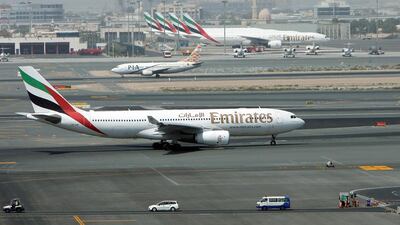DUBAI // Emirates is to resume flights to Baghdad on March 1.
The Dubai airline joins budget operator FlyDubai, which resumed flights to the Iraqi capital on Sunday, in reopening the route.
Etihad Airways, however, has yet to return to its schedule, with its flights to the Iraqi capital still suspended.
All flights from UAE-based airlines were ordered to stop on January 26 after a FlyDubai jet carrying 154 passengers came under small-arms fire as it landed at Baghdad International Airport.
Fortunately, no one was injured in the incident.
The aircraft sustained damage to its fuselage and resulted in the General Civil Aviation Authority (GCAA) banning flights pending a review of safety and security.
“The return of services between Dubai and Baghdad follows a comprehensive safety and security review in conjunction with the GCAA,” said Majid Al Mualla, divisional senior vice president of commercial operations at Emirates.
“Our flights to Baghdad have provided essential economic links for the capital and it is good news for our customers that we can now restart operations.”
Emirates said that it would return to its normal schedule of six flights a week to Baghdad, which will be served by A330-200 aircraft in a three-class configuration.
The airline said Baghdad had been one of its destinations since 2011 and flights to Erbil and Basra were unaffected by the incident.
A spokesman for FlyDubai said that the airline had reopened flights on Sunday after getting approval from the GCAA.
“On February 12 the GCAA issued a directive to all UAE national carriers lifting the suspension of flights to Baghdad and we resumed our daily service to Baghdad on February 22,” said the spokesman.
A spokesman for Etihad said: “Etihad Airways’ Baghdad service remains suspended.” Air Arabia, meanwhile, resumed its flights from Sharjah to Baghdad last week.
Bahraini carrier Gulf Air said on February 5 that it would resume flights to the city.
After the gunfire incident, the Iraqi ambassador to the UAE was summoned to the Ministry of Foreign Affairs and informed of the grave concern the UAE had about the attack.
Mohammed Al Raisi, the undersecretary at the ministry, called on Iraqi authorities to launch a full investigation and to provide the required safety guarantees and protection under international agreements on civil aviation safety.
Defence experts at the time said that ISIL militants may have been behind the attack as a response to the Iraqi army retaking Kobani, the Syria-Turkey border town that has been at the centre of many battles involving ISIL.
There was also a real fear that there could be copycat attacks at other airports in Iraq.
nhanif@thenational.ae

